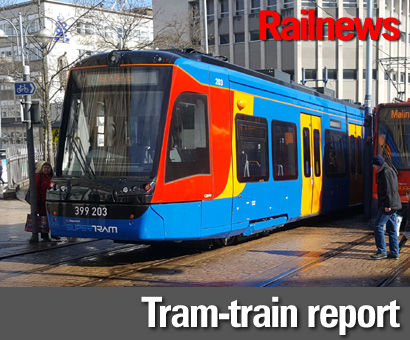THE cost of a tram-train service between Sheffield and Rotherham has risen from £15 million to £75 million, the project is running several years late and last year the government was advised to cancel the project – a suggestion which it did not accept.
These facts are revealed in a new report from the National Audit Office which examines the costs and difficulty of adapting Network Rail infrastructure so that tram-trains can share tracks with conventional trains.
The report explains: “The business case was based on the benefits to local transport users, such as reduced journey times. The benefit-cost ratio of 1.0 fell into the Department’s ‘low’ value-for-money category. The Department considered the wider benefits of the pilot, such as lower industry costs and economic benefits, to be ‘very uncertain’. In May 2012, HM Treasury approved the project ‘on an exceptional basis’ to allow a more detailed evaluation of the value-for-money of tram-train schemes.”
It concludes that there were several fundamental problems, including errors in the original cost estimates, the complexity of merging the technologies of heavy and light rail, the condition of the existing track and structures and the development of new techniques and ways of working which were more challenging than the project’s planners had expected.
Seven tram trains have been procured by South Yorkshire PTE, with most of the funding coming from the DfT, and are currently being tested on conventional tramway sections, but last July the DfT’s Rail Investment Board concluded that ‘under normal circumstances there was no commercial justification to provide further funding to the project’, and recommended that it should be cancelled, because many of the lessons about using tram‑trains in the UK had been learned and cancellation would release at least £20 million from the Department’s budget.
However, scrapping the scheme would have wasted around £25 million already spent by Network Rail on the DfT’s behalf, and cancellation would also have triggered ‘significant stakeholder and media criticism’.
Although the benefit-cost ratio had worsened as costs spiralled, declining to 0:31, the DfT still believed that there was a ‘strategic business case’, partly because other towns and cities with tramways were interested, at least potentially.
According to the Rail Investment Board, the decision reflected ‘the strong desire of the Minister [Paul Maynard] to see the lessons learned from this pilot available for the development of further tram-train schemes with greater potential elsewhere in the country – such as Cardiff Valleys, Glasgow Airport and Manchester’.
Mr Maynard wrote to Network Rail confirming that the pilot should continue and inviting it to ‘consider funding options’. In response, Network Rail closed a gap of more than £26 million by transferring £4.6 million from its renewals budget and also effectively borrowing £21.9 million from the budget for Control Period 6, which does not start until April 2019.
Until then most of the funding had come from the DfT, and Network Rail had originally expected to spend just £3.3 million on modifying the heavy rail section between Tinsley and Rotherham,
Although tram-trains are now being tested in the streets of Sheffield, the NAO says services through to Rotherham on Network Rail infrastructure are not expected to begin until next summer, while in May this year the Supertram concession holder Stagecoach successfully claimed £2.5 million from the DfT in compensation for lost revenue.
Rob McIntosh, who is Network Rail’s London North Eastern and East Midlands Route managing director, said: “Sheffield to Rotherham tram-train is an ambitious pilot, a UK first, that will bring new travel choices to people of South Yorkshire when services begin in 2018. The project continues to be complex and challenging but will deliver real benefits for thousands of daily commuters.
“Costs and timescales have moved as the project itself has grown in scope and complexity and has had to incorporate more significant infrastructure changes than originally planned. Good progress is being made and a new project team is now in place and driving the scheme to its conclusion.
“The project has learned from tram-train systems in Europe that have encountered their own challenges but there were still a significant number of unique issues to the UK that had to be overcome.”


